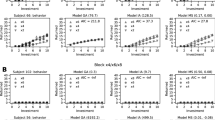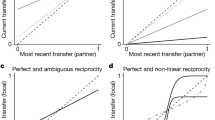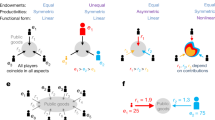Abstract
Here we report the results of an experiment that tests the reciprocal risk reduction1 and ‘tolerated theft’ or taking hypotheses2 for why the human species is unique in having extensive exchange of resources among non-kin. We designed an experiment to determine whether, in response to variance of resource acquisition, people exchange food resources via taking or, alternatively, form reciprocal relationships based on giving. In the experiment, subjects forage individually, experience variation in resource acquisition, and then consume either by actions in which resources are taken from, or moved to, others in a group environment. The key feature of the experimental design is that individuals can transfer resources to others, attempt to take resources from others and defend against take-away attempts. Many subjects begin by attempting to take resources from others, who can resist those attempts at a cost to each. Over time, subjects shift to a cooperative strategy of voluntary reciprocal giving, a response not suggested by the instructions. These results provide evidence that people are independently able to overcome initial use of taking strategies, evaluate gains from exchange, and create endogenous reciprocal trading relationships as a response to unsynchronized variance in resource availability.
This is a preview of subscription content, access via your institution
Access options
Access Nature and 54 other Nature Portfolio journals
Get Nature+, our best-value online-access subscription
$29.99 / 30 days
cancel any time
Subscribe to this journal
Receive 12 digital issues and online access to articles
$119.00 per year
only $9.92 per issue
Buy this article
- Purchase on Springer Link
- Instant access to full article PDF
Prices may be subject to local taxes which are calculated during checkout


Similar content being viewed by others
References
Kaplan, H., Hill, K. & Rowe, V. Food-sharing among Ache foragers: tests of explanatory hypotheses. Curr. Anthropol. 26, 223–246 (1985).
Blurton Jones, N. G. Tolerated theft, suggestions about the ecology and evolution of sharing, hoarding, and scrounging. Social. Sci. Inf. 26, 31–54 (1987).
Hill, K. R. et al. Co-residence patterns in hunter-gatherer societies show unique human social structure. Science 331, 1286–1289 (2011).
Isaac, G. The food-sharing behavior of protohuman hominids. Sci. Am. 238, 90–108 (1978).
Hill, K. & Hawkes, K. in Adaptive Responses of Native Amazonians (eds Hames, R. & Vickers, W.) 139–188 (Academic, New York, NY, 1983).
Gurven, M., Hill, K., Kaplan, H. Hurtado, A. & Lyles, R. Food transfers among Hiwi foragers of Venezuela: tests of reciprocity. Hum. Ecol. 28, 171–218 (2000).
Hawkes, K., O’Connell, J. F. & Blurton Jones, N. G. Hadza meat sharing. Evol. Hum. Behav. 22, 113–142 (2001).
Gurven, M. To give and to give not: the behavioral ecology of human food transfers. Behav. Brain Sci. 27, 543–559 (2004).
Gurven, M. Reciprocal altruism and food sharing decisions among Hiwi and Ache hunter-gatherers. Behav. Ecol. Sociobiol. 56, 366–380 (2004).
Hames, R. in Human Behavior and Adaptation: An Anthropological Perspective (eds Chagnon, N. et al.) 397–416 (Aldine de Gruyter, New York, NY, 2000).
Gurven, M., Allen-Arave, W., Hill, K. & Hurtado, A. M. Reservation food sharing among the Ache of Paraguay. Hum. Nat. 12, 273–297 (2001).
Winterhalder, B. Diet choice, risk, and food sharing in a stochastic environment. J. Anthropol. Archaeol. 5, 369–392 (1986).
Kameda, T., Takezawa, M., Tindale, R. S. & Smith, C. M. Social sharing and risk reduction: exploring a computational algorithm for the psychology of windfall gains. Evol. Hum. Behav. 23, 11–33 (2002).
Kaplan, H. S., Schniter, E., Smith, V. L. & Wilson, B. J. Risk and the evolution of human exchange. Proc. R. Soc. B 279, 2930–2935 (2012).
Smith, J. M. The theory of games and the evolution of animal conflicts. J. Theor. Biol. 47, 209–221 (1974).
Acknowledgements
We acknowledge the financial support of Chapman University. The funders had no role in study design, data collection and analysis, decision to publish, or preparation of the manuscript. We thank J. Kirchner for software programming and M. Luetje for recruiting the participants.
Author information
Authors and Affiliations
Contributions
H.S.K., E.S., V.L.S. and B.J.W. contributed equally to designing the research, carrying out the experiments, analysing the data and writing the paper.
Corresponding author
Ethics declarations
Competing interests
The authors declare no competing interests.
Additional information
Publisher’s note: Springer Nature remains neutral with regard to jurisdictional claims in published maps and institutional affiliations.
Supplementary information
Supplementary Information
Supplementary Methods, Supplementary Tables 1–3
Rights and permissions
About this article
Cite this article
Kaplan, H.S., Schniter, E., Smith, V.L. et al. Experimental tests of the tolerated theft and risk-reduction theories of resource exchange. Nat Hum Behav 2, 383–388 (2018). https://doi.org/10.1038/s41562-018-0356-x
Received:
Accepted:
Published:
Issue Date:
DOI: https://doi.org/10.1038/s41562-018-0356-x
This article is cited by
-
Sharing, gift-giving, and optimal resource use in hunter-gatherer society
Economics of Governance (2021)
-
Gathering Is Not Only for Girls
Human Nature (2021)
-
Consistent differences in a virtual world model of ape societies
Scientific Reports (2020)



